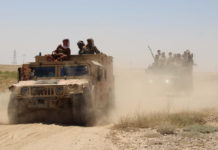INDIANAPOLIS — The secret sauce remains elusive to those trying to find the perfect formula for scouting college quarterbacks. It’s quite possible the code will never be cracked. There will always be hits and misses as the search for the next Patrick Mahomes or Tom Brady ensues. There is no perfect process.
Different evaluators concentrate on different traits. Some might be physical and easy to spot, others like trying to find a foul stench in the wind.
The answers received around NFL combine week about top priorities for a quarterback prospect ranged from instincts to leadership to functional intelligence to decision-making to production. One thing became certain roaming Indianapolis: Height isn’t at the top of the list.
This is especially relevant with Oklahoma’s Kyler Murray, all 5-foot-10 1/8 of him, in this year’s NFL draft. It seemed as if all the talk out of Indianapolis — from those working for teams to those close to Murray — was he would be the No. 1 overall pick by the Arizona Cardinals.
The New York Giants would be next team in line with the need for a quarterback. They select No. 6 overall and seem headed for a collision course with quarterback Dwayne Haskins, especially after multiple sources told ESPN he impressed during an important 15-minute interview at the combine.
Haskins, listed at 6-foot-3 and 220 pounds, achieved his goal of showcasing the smarts he has attained running a pro offense by going through progressions and setting protections at Ohio State. It checked some boxes and could help come late April, when the Giants are deciding whether Haskins can be their next franchise quarterback and the eventual successor to Eli Manning.
Missouri’s Drew Lock and Duke’s Daniel Jones are other long shot possibilities. Each has a different skill set and temperament.
When: April 25-27
Where: Nashville, Tennessee
How to watch: ABC/ESPN/ESPN App
• McShay’s Mock Draft 3.0: Updated picks »
• Answering 10 intriguing draft questions »
• Kiper’s Mock Draft 2.0: Going 1-32 »
• Kiper’s Big Board » | McShay’s Top 32 »
• Draft order: Picks 1-32 set »
• More NFL draft coverage »
The decision could depend on what the Giants see in each prospect. General manager Dave Gettleman is looking for a quarterback who can make all — or most — of the throws. He wants a quarterback who is athletic, but pass-first, not run-first. It’s the subtle pocket movements that matter most to the evaluator who has watched Jim Kelly, John Elway, Manning and Cam Newton most of his career.
This could play a large part in the Giants’ decision. Haskins’ pocket presence and ability to navigate around pressure might be the biggest question about his game. Can he move enough?
This is important to Gettleman, but not necessarily the most important quality being sought.
“A non-negotiable for me is instincts. It really is,” Gettleman said. “There are guys that are big, great arm, great athletes. They can’t figure it out. I don’t think people talk about it enough. Instincts are critical. You turn around at every position — people will fall in love with the height, weight, speed, defensive tackle, but you put his hand in the dirt, he can’t find the ball, he doesn’t understand blocking schemes — so all this great height, weight, speed, whatever he’s got, it doesn’t make a difference.”
Instincts are something you can’t necessarily put your finger on and say, “Aha, that’s it!” But neither are some other vital quarterback qualities that evaluators prioritize, which further adds to the subjective nature of the process and complicates matters.
A feel for the game — which cannot be quantified — matters.
“A guy has to have a natural instinct on where to go with the ball, and he can place it where he wants to,” a quarterbacks coach said. “That is kind of the whole thing.”
One NFL executive considered leadership his No. 1 skill for a quarterback. There isn’t a be-all, tell-all database for leadership. Wins and losses only tell part of the story. Speaking to coaches and teammates can help, but it’s ultimately a projection when you’re trying to figure how a 20-something will be able to lead grown men. That executive had decision-making and accuracy second and third on his QB priority list.
An NFL coach listed functional intelligence, natural decision-making and accuracy as his top three needs when evaluating college quarterbacks. Another had a quarterback’s ability to control the game, poise in the pocket and vision atop his list.
Arm strength and height weren’t necessarily prioritized by the more than a handful of executives, scouts and coaches polled. In fact, one coach was weary of quarterbacks over 6-foot-4. Hand size was viewed by some as simply a compensating factor for height.
It doesn’t mean there isn’t a minimum threshold for all, but they’re not top priorities.
“Accuracy over arm strength,” according to a scout.
To some, this isn’t necessarily new. It has nothing to do with spread offenses and consistently shorter throws in today’s NFL.
“It hasn’t changed,” a second executive said. “I just think people have been looking at the wrong thing. People are still talking about arm strength in 2019. … There is no correlation between having a strong arm and being a great quarterback. There is a certain standard you must have, but once you get that, anything after that, it doesn’t matter who has the strongest arm in the NFL.”
What does seem to matter most is that a quarterback can create, whether it be by using different arm angles, sliding in the pocket or running. The evaluators polled seemed to be in agreement that avoiding pressure and making plays under duress was mandatory.
It’s something the Giants seem to be prioritizing for their next quarterback.
“I really value a guy that can move around, because that doesn’t mean he’s a runner,” Giants coach Pat Shurmur said. “It just means he has a way to clean his feet in the pocket or scramble when necessary. Typically, if you’re going to have long drives and do it on a consistent basis, somewhere in that drive the quarterback has to do something with his feet to keep a drive alive or get a first down. Even guys that are not considered mobile, it might be subtle movement in the pocket. That mobility, I think, is very important. I think it’s essential, really, for a quarterback to have great success.”
These comments make it all the more curious that the Giants appear fully committed to Manning for another season and uncertain on Haskins as the answer. But that is the beauty of the quarterback decision. A prospect rarely checks every box, and if he does for one evaluator or team, he might not for another. So much of it seems subjective.
For one team, Murray’s mobility, natural football instincts and leadership might be ideal. For another, Haskins’ ability to make throws, calm under pressure and knowledge of the game and route concepts might be perfect. When it comes to the quarterback position, it’s in the eye of the beholder.
Source : ESPN












